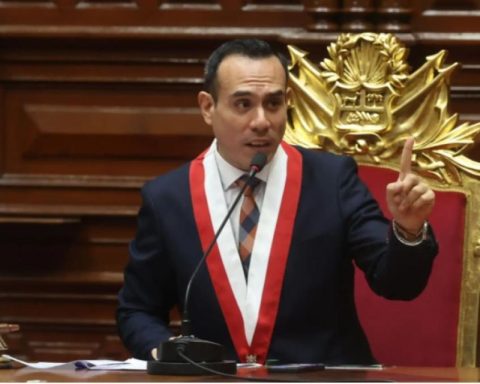
The critical view of current justice is cross-cutting and the constituents expressed it yesterday, on a historic day, as it was the first time that the plenary began to vote in general on the report of the Justice System commission, which includes the principles that could be part of the new Constitution.
A long day that was marked by intense previous meetings, which began on Monday, until late, and resumed this Tuesday very early. Different groups took count of the votes and others fine-tuned the strategy of their votes, the majority advancing a favorable vote in general in several articles, but anticipating that the debate in particular would be hard.
Shortly before 2:00 p.m., a debate resurfaced that some considered closed: constituents gave lights of wanting to play in plenary, prior to the debate on the report, the point on the interpretation made by the board of directors on Monday in favor of maintaining the application of the two-thirds in the vote on the reports in general, by 5 votes in favor of maintaining the quorum and 3 against, after 50 conventional members requested the review of that definition on Sunday. That edge, in fact, was the one that took up the debate in the first part of the plenary session, opening the flank by the constituent Mauricio Daza, who claimed that official letter 504 “did not interpret the regulation, what it did directly was incorporate a norm that had been rejected”, alluding to the fact that the supramajoritarian quorum was applicable to constitutional norms, not to general commission reports, urging, therefore, that it be the plenary session that deliberated the dilemma, to which other constituents joined.
On the other hand, constituents of Vamos por Chile reaffirmed their support for the decision of the table, while the constituent Fernando Atria (FA) said that “it is clear that the norms are approved by 2/3 and it is clear that in the vote in In general, what is voted on are not the reports but the regulatory proposals contained in the reports, the conclusion is categorical in the sense established by the table”. Likewise, the constituent Alondra Carrillo (MSC) despite the fact that she was not going to apply the two thirds, defended the decision of the table as the instance mandated to make the interpretation.
After a few hours and after several interventions, it was the president of the CC, María Elisa Quinteros, who settled the controversy, reaffirming the decision made by the table, in which she voted against the interpretation maintained by two thirds. “The eight members of the table took on this challenge of interpreting those obscure rules of the regulation, with a spirit of transparency and efficiency. This is how we have worked on this proposal, therefore, we will respect the decision according to the regulations that we have granted ourselves, “she stressed.
With water in the pool
Given the request for a separate vote made by constituents, the text was not voted in a unitary manner, but rather each of the 16 articles was voted separately. Despite the debate by the quorum, in most of the articles the 103 votes necessary to approve were far exceeded. In summary, 14 points were approved, and only 2 were rejected. A positive balance for the majority of the constituents, who celebrated the progress of a large part of the articles in general, which is seen as a support for the debate that is taking place in each commission and that would be a thermometer of how things are going for the other commissions, such as the Form of State that today submits its report to the plenary session.
In the speeches, which lasted until about 11:30 p.m., the criticism focused on at least 3 articles: number 2, on legal pluralism; 4, on irremovability of judges; and 8, on execution of resolutions. The efforts were concentrated on the second, legal pluralism, which many thought could fall. Several meetings, negotiations and explanations were held that what was sought was to include it in general in the Constitution and then review the details, including through legislation. The accusation of some sectors is that it was a parallel justice system, and that by applying indigenous justice it affected equality before the law. But finally It was widely approved by 114 votes in favor and 37 against..
Specifically, the article establishes that “the National Justice System coexists, on an equal footing, with the Indigenous Legal Systems. It is the duty of the State to guarantee adequate coordination between the two, with full respect for the right to self-determination and international human rights standards interpreted interculturally.”
The Constituents of Vamos por Chile led the criticism and had announced their rejection of legal pluralism. The constituent Eduardo Cretton (UDI) argued that “the proposed proposal does not offer us the existence of a legal system for all Chileans, but rather an inorganic proposal that considers various justice systems depending on whether or not we belong to an original people. Thus , an ordinary Chilean will be judged and measured by a different rod than that of a Mapuche or a Rapa Nui. That is an attack against equality before the law.” The doubts that it could be rejected rested mainly on the fact that the already explicit rejection of Vamos por Chile was compounded by the doubts of the Socialist Collective, which hours before the vote had decided to approve.
In general, there was transversal support in the other sectors of the CC, specifying that the details would be the subject of another discussion and that it was about recognizing the indigenous justice system, as other countries do. The constituent of the Mapuche people, Rosa Catrileo, stressed that this proposal includes the right of the communities “to regulate themselves according to their own vision of the world in the community life that we lead. This is not a creation or invention of this Convention, it is a right that is recognized at the international level.”
The constituent Carolina Sepúlveda (INN) emphasized that several raised that a different justice system for indigenous peoples is not possible, “as if military justice did not exist in Chile. I have not heard anyone (saying) that this is a trouble”.
One of the points was rejected, by 89 in favor and 62 against – not achieving the ⅔ – and that it was within the possibilities of it happening, it was the article 4, on the tenure of judges. Paragraph 1 had a consensus of support, since it establishes that “judges are irremovable and cannot be suspended, transferred or removed except by the Council of Justice, in accordance with the causes and procedures established by the Constitution and the laws.” The controversy lies in the second paragraph, which says that “they cease in their positions only when the term established for it expires, by reaching seventy years of age, by voluntary resignation, by verifying a supervening legal incapacity or by removal.” The problem is that it was not made explicit that it was intended only for the Supreme Court, and not for judges of first instance and the Court of Appeals. There are already agreements to improve said wording. In fact, when rejected, it returns to the Justice System commission.
In the debate, the constituent Ruggero Cozzi (RN) emphasized another point, referring to the change of the concept of Judicial Power to Justice Systems, accusing that only the Venezuelan constitution used this term. “You cannot have chosen a worse example to imitate than the Venezuelan justice system. This change is a real treat for the Communist Party. The signal is terrible”, he said, in the midst of the claims of constituents from other sectors, who in his interventions accused him of minimizing other constituent forces that participated in the intense debate of the Justice System commission.
The second article rejected was number 8, on Execution of Resolutions, with 88 votes in favor and 63 against.. “In order to enforce their resolutions and carry out or have carried out the actions determined by law, the bodies that exercise jurisdiction may issue direct orders or instructions to the public force and to any other authority or person, who must comply with what is mandated quickly and expeditiously. , without being able to qualify its fairness, foundation, opportunity or legality. The sentences and resolutions issued in the International System for the Protection of Human Rights will allow reviewing the effect of res judicata of the final sentences issued by courts of the State of Chile”, says the article.
The criticisms, shared among right-wing constituents, from the Colectivo del Apruebo, Colectivo Socialista and others, are related to affecting or attacking sovereignty, by including the international system for the protection of human rights. The constituent Fuad Chahín (DC) said that “establishing international standards as a source of law, what it does is precisely attack our sovereignty.” The article also returns to the Justice System commission. Those approved now move on to their particular discussion, where several warn that the main debates will take place.
In numbers: what was approved and what was rejected
- Article 1: The jurisdictional function. Passed by 107 votes in favour, 41 against and 3 abstentions
- Article 2: legal pluralism. Passed by 114 votes in favor and 37 against
- Article 3: Jurisdictional independence, impartiality and exclusivity. Passed by 113 votes in favor, 37 against and 1 abstention
- Article 4: Irremovability. Rejected by 89 votes in favor and 62 against
- Article 5: Right of access to justice. Passed by 140 votes in favour, 7 against and 2 abstentions
- Article 6: Effective jurisdictional protection. Passed by 128 votes in favor, 21 against and 1 abstention
- Article 7: Inexcusability and indelegability. Passed by 114 votes in favor and 36 against
- Article 8: Execution of resolutions. Rejected by 88 votes in favor and 63 against
- Article 9: Foundation and clear language. Passed by 114 votes in favour, 33 against and 4 abstentions
- Article 10: Gratuity. Passed by 141 votes in favour, 2 against and 5 abstentions
- Article 11: Principle of jurisdictional responsibility. approveor by 113 votes in favour, 36 against and 2 abstentions
- Article 12: Publicity, probity and transparency. Passed by 145 votes in favor and 4 abstentions
- Article 13: Open justice principle. Passed by 128 votes in favor, 22 against and 1 abstention
- Article 14: Parity and gender perspective. approveor by 115 votes in favour, 24 against and 13 abstentions
- Article 15: Plurinationality, legal pluralism and interculturality. Passed by 114 votes in favor, 37 against and 1 abstention
- Article 16: Collaborative Conflict Resolution Mechanisms. Passed by 150 votes in favor and 1 abstention

















